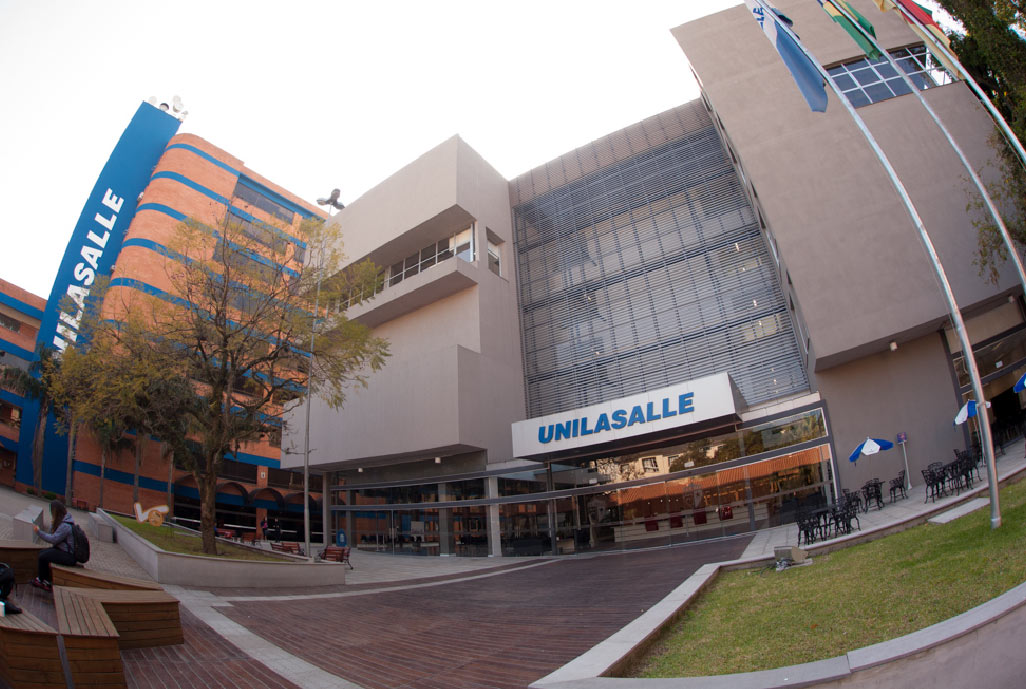
Applied Social Sciences
![]()
 Architecture and Urbanism
Architecture and Urbanism
How are architects and urbanists like
Architects are professionals who study and apply strategies for the construction of the city’s future, with technological mastery and critical vision related to the conception, organization and construction of indoor and outdoor spaces, comprising the urbanism, the edification, the landscaping, as well as the conservation and valorization of the patrimony built, the protection of the natural environment balance and the rational use of the available resources.
Where do architects and urbanists work?
The architect and urbanist may work in supervision, coordination, management and technical guidance activities; planning, project and specification; study of technical and environmental viability; technical support, advisory and consultancy; inspection, investigation, assessment, monitoring, reporting, expert’s opinion, auditing and arbitrage; performance of technical position and function; training, budget draw up, specialized technical production and disclosure; and execution, inspection and realization of work, installation and technical service.
Bachelor’s Degree: Duration of 10 semesters (Evening)
Architecture and Urbanism Program Coordinator: Ítalo Galeazzi
 Administration
Administration
How is the administrator?
He knows how to see organizations and businesses as a whole, and can manage sectors or be a member of the senior management, defining directions and strategies. He is organized, strategic, entrepreneurial and has good interpersonal skills. He can act in different sectors and positions, so he has a systemic profile.
Where does the administrator work?
In public and private institutions, performing planning, organization, implementation and control for managing people, production, market performance and financial resources, property, materials and technology involved in the management process.
Bachelor’s Degree: 8 semesters long (morning and night)
Administration Program Coordinator: Silvio Denicol Jr
 Accounting
Accounting
How is the accountant?
He likes numbers, knows working with secrecy and discretion, in addition to have ease of communication and versatility to make reporting and analysis. Updated on financial data and the business world, the counter is organized, logical and proactive.
Where does the countaccountinger work?
In the organization and execution of regulated and authorized legally services to an accountant in companies and private organizations. He works acting in the public sector as Accountant, Tax Auditor and other positions that require diploma and in advisory in financial, accounting, tax and controlling areas as a self-employed.
Differentials of the Unilasalle Accountant
Contact with the practical reality of accounting through the use of educational didactic software of specific accounting for teaching, conducting integrated activities with other courses of Applied Social Sciences, personalized support to the student and in placing him in internships. The entire teaching staff is active in the labor market.
Bachelor’s Degree: 8 semesters long (at night)
Accounting Program Coordinator: Patrícia Coelho Motta de Souza
 Law
Law
How is the Bachelor in Law?
He is curious, with an investigative profile, who likes to face good hours of reading and knows the importance of constant updating. In addition, this professional has a social profile and values the transformation of reality through mediation and conflict resolution. He will pervade many areas and diverse knowledge, having a holistic view of legal sciences and their relations with different historical times.
Where does the Bachelor in Law work?
When graduated, he is bachelor in legal sciences, needing to take the exam of OAB to have the lawyer title. From then he will act on legal advice, or as self-employed in different areas of the Law. He can also join in the careers of Magistrates, prosecutors, Public Safety, Public Defenders, Attorneys and other Direct and Indirect Administration, which require legal training.
Differentials of Bachelor of Laws of La Salle University
He combines theory and practice since the first half of the course through seven stages of simulated practice and two actual practices present in the curriculum. He acts in the Legal Laboratory in Legal Practice Center and the Special Jurisdiction of Civil Courts, all located on the Campus of Unilasalle.
Bachelor’s Degree: 10 semesters long (at night)
Law Program Coordinator: Raffaella Porciuncula Pallamolla
Biological Sciences
![]()
 Biological Science
Biological Science
How are biologists like?
They are concerned with nature and with all that is in their surroundings, the biologists are restless people who don’t get tired of questioning and changing their reality. It is easier for them to work in team and to have technical grounds to defend their position, promoting the preservation and education in favor of the environment and the human being.
Where do the biologists work?
They work in several public and private entities and organizations, or as autonomous professionals, developing researches, studies, reports and rendering environmental services (consultancy, planning, evaluation and management), development of projects to preserve the biodiversity and environmental education, among other activities defined by the Federal Board of Biology.
Differential of La Salle University’s Biologists
They have an education with emphasis in the environment and biodiversity, acting intensively in the practical part, with 25% of the curriculum dedicated to fieldwork, especially in Botany, Ecology and Zoology. They make use of the structures of the Microscopy, Microbiology, Applied Biology, Handling and Physiology Laboratories, and the Museum of Natural Science. They have individual follow-up in academic and work placement matters.
Teacher’s Degree: Duration of 7 semesters (Evening)
Bachelor’s Degree: Duration of 8 semesters (Evening)
Biological Science Program Coordinator: Juliana Gomes
Business and Management
![]()
 Technology in Logistics
Technology in Logistics
How is the technologist in logistics?
He has perceived location, developed logical and abstract thought and is at ease of planning systems and to understand chained and integrated processes. He is entrepreneurial, open the suggestion of new technologies to carry out his activities and he values teamwork.
Where does the technologist in logistics work?
The Technologist in Logistics can act in any position where the managerial view of the supply chain is necessary: inventory management, purchase orders, insurance, warehousing, in transportation, material handling, packaging, logistic in the transport area, planning and security.
Differentials of the Technologist Logistics of Unilasalle
He has references of related courses in the social sciences and applied technology courses, as well as personalized support to the student and in the collocation of internships. All the entire teaching staff is active in the labor market.
Technologist: 4 semesters long at night)
Thechnology in Logistics Program Coordinator: Carlos Eduardo Sabrito
 Technology in Marketing
Technology in Marketing
How is the technologist in Marketing?
Updated to market trends, researcher and communicator, this professional also is at ease in working in teams. Strategic and knowledgeable of marketing tools to promote the concept, company or brand with which he works. He is dynamic, entrepreneurial and versatile in finding solutions and working strategies.
Where does the technologist in marketing work?
In marketing and advertising companies, developing communication tools and advertising campaigns aimed at the achievement of business objectives. He may be a director, advisor, consultant or marketing planner in public or private companies; entrepreneurial of projects of new products and services; he acts in market research and advertising agency companies.
Differentials of the Technologist in Marketing of La Salle University
Training focused on the labor market, with a broad market vision, using the own professional experiences of the student and member companies. He can continue his education with an MBA in Marketing Management Services and Retail, already consolidated in the institution. Conducts activities integrated with students and teachers from other Unilasalle courses.
Technologist: 4 semesters (at night)
Administration Program Coordinator: Paulo Roberto Ribeiro Vargas
 Technology in Management Processes
Technology in Management Processes
How is the technologist in management processes?
He has a practical, organized and systemic profile. Adapted to the tools of systems that assist in the management routines, he likes working with improvements in processes of companies and organizations. He is the facilitator of processes, practical and has an entrepreneurial vision. He searches immediate insertion in the labor market.
Where does the technologist in managerial processes work?
In companies and public and social institutions developing and implementing business plans, fostering entrepreneurship through the use of techniques and methods of managing and promoting the effective growth of organizations.
Differentials of the Technologist in Management Processes of Unilasalle
He integrates theory and practice in different disciplines through visits to companies and market realities, and contacts teachers who are in the job market. Exercises to practice also in Synergy Junior Company, under the supervision of a teacher in real cases of community businesses.
Technologist: 4 semesters long (at night)
Thechnology in Management Processes Program Coordinator:Carlos Eduardo Sabrito
Cultural Production and Design
![]()
 Technologist in Graphic Design
Technologist in Graphic Design
How is the graphic designer?
Interested in arts, communication and information technologies. It is creative and innovative and enjoys photography and design. Dynamic, this professional works with multiple skills and knows how to work individually and as a team, having good relationships with clients and professionals from various fields.
Where the graphic designer works?
Works in advertising, design offices, media, journalism and film , printing companies and any other companies that work with visual communication agencies . Can be self-employed , providing technical assistance and advice to businesses in the area of visual communication.
Highlights of Technology in Graphic Design Unilasalle
Enjoys partnerships with industries and companies, developing projects integrated with the market reality. During the course has classes in laboratories with specific technology for the course.
Technologist: 4 semesters duration (Nocturne)
Technologist in Graphic Design Program Coordinator: Josiane Andreia da Costa
Engineering
![]()
 Civil Engineering
Civil Engineering
How is the civil engineer?
He is a professional who literally embodies what people think and dream. His works represent much more than an asset, and are essential for life. They are roads, dams, avenues, buildings, terminals, stadiums, among many other buildings that contribute to life in society. This is the profile of civil engineer who calculates and observes several variables so that the result of his work will bring functionality and security.
Where does the civil engineer work?
He can plan, design, build, manage and maintain works and services in buildings, structures, geo-techniques, transport, water and sanitation. In these areas, the professional will be able to carry out surveillance activities, direction and execution of works, technical services, surveys and expertise. He can work in consulting firms and as self-employed and work as a teacher or researcher at universities and research centers.
The civil engineer of La Salle University
The training is outstanding for the knowledge of contemporary issues to realize the impact of solutions in Engineering and integration expertise with a human and Christian formation.
Bachelor’s Degree: 10 semesters long
Civil Engineering Program Coordinator: Alexandre Knop
 Production Engineer
Production Engineer
How is the production engineer?
He operates in all the places where it is need to optimize processes, increasing productivity and advancing quality. Managing human, financial and material resources, the production engineer is a key part in industrial and service companies. He combines knowledge of business, economics and engineering to rationalize work, improve production techniques and sort financial activities, logistics and trade of an organization.
Where does the production engineer work?
A bank, a snack bar or a hospital seem unusual places for the work of an engineer, right? But this is not for the production engineer. For acting as a link between the technical sector and the regulatory, his field extends beyond the boundaries of the industry. With a profile and versatile training, he meets the requirements demanded by the market, both industrial and of services.
The Unilasalle production engineer
He is a professional who does not have as goal only technical training but a humanist, critical and reflective education. Focused on the techniques and Lean Manufacturing tools, the Unilasalle production engineer will also have a training connected with the opportunities of the current Brazilian scenario, which requires increasingly skilled engineers.
Bachelor’s Degree: 10 semesters long
Production Engineering Program Coordinator: Silvio Denicol Jr
 Electrical Engineering
Electrical Engineering
What is the professional’s profile?
He has a critical view of the social, political and economic transformations. He searches the improvement in human relations, work and production, being a critical element and creator of new methodologies. Without leaving aside the human question, the electrical engineering professional adapts the technology in favor of the innovation.
Why should you study at La Salle University?
The Electrician Engineer graduated from La Salle University will have a broad and complete training, as well as a generalist, being able to work in the areas of electronics, control and automation, telecommunications and electrical energy systems. The graduated will be prepared to deal with scientific and technological developments in energy systems of all kinds, contributing decisively to the growing needs for energy consumption and the appropriate use of clean and renewable energies. In addition, the graduated will be able to design, create, manage and innovate in a unique way, articulated with society, companies and government.
The course has as indispensable the solid formation in the knowledge of the exact sciences, combining theory and practice. The academic has specialized laboratories: Energy Conversion, Renewable Energy Systems and Control, Automation, Robotics and Drives, also sharing an innovative Fab Lab, a 24 hours Laboratory and a Mobility Lab (MobiLab).
Bachelor’s Degree: 10 semesters long
Electrical Engineering Program Coordinator: Luis Fernando Espinosa Cocian
 Mechanical Engineering
Mechanical Engineering
What is the professional’s profile?
The mechanical engineering graduated has a scientific basis, cultural scope, entrepreneurial character, competence to deal with technological problems, development of new technologies and ability for teamwork and leadership. He also stimulates essential aspects for the professional to develop an integrated view of the economic, social, ecological, technological and innovation dimensions of the environment in which he / she will act, in order to promote balanced and sustainable development.
Why should you study at La Salle University?
The graduated professional from La Salle University is qualified to work in several areas of Mechanical Engineering, being able to identify and solve problems, innovate and create new technologies, because since from the beginning of the course the student already has the challenge of working on projects.
The student is challenged to increase new knowledge to the projects, reaching the end of the course with clarity, autonomy and distinction to perform the graduation conclusion work and work in the professional market.
Bachelor’s Degree: 10 semesters long
Mechanical Engineering Program Coordinator: Dalmedson Gaúcho Rocha de Freitas Filho
 Chemical Engineering
Chemical Engineering
How is chemical engineer?
The role of this professional is related to all the physicochemical transformation. The chemical engineer creates raw materials extraction techniques, as well as its application used or processed in chemical, petrochemical products, such as paints, plastics, textiles, pulp and paper, power, nanotechnology among other activities. He develops products and equipment, in addition to research more efficient technologies. Designs and directs construction and assembly plants, power plants and industrial waste treatment stations.
Where does the chemical engineer work?
In chemical laboratories in the supervision, implementation and monitoring of chemical and physical-chemical analysis of raw materials, waste or effluent, industries, government agencies and research institutes. He also works in preparation, handling and sale of chemicals and in advisory and consulting, in issuing technical expertise or reports. He might also work in quality control in industry and in research and development of new products and analytical techniques.
The chemical engineer of La Salle University
The chemical engineer La Salle University will have a generalist education, which will enable him to work in various branches of the labor market. The humanist, critical and reflective integrates his features.
Bachelor’s Degree: 10 semesters long
Chemical Engineering Program Coordinator: Juliana Gomes
 Telecommunication Engineering
Telecommunication Engineering
How is the telecommunications engineer?
He likes the hard sciences, creating solutions through physics and mathematics. He has a logical and advanced abstract reasoning and can understand even when systems are not built physically. Concentrated, stubborn and logical, this professional creates communication solutions through different devices and technologies.
Where does the telecommunication engineer work?
He works on fixed or mobile telephone companies, Internet service providers, broadcast television or cable companies, or any organization that needs solutions in telecommunications. He makes projects and guides the maintenance of the systems also has cable knowledge of antennas, electronics, optical communications, computer networks, microwave, among others.
Differentials of the Unilasalle telecommunication engineer
He develops studies in laboratories with professional equipment and teacher monitoring in keeping the labor market. The course has agreements with several companies in the region. There are 10 information technology laboratories, one of them being 24 hours (available to students who lack appropriate machinery at home to carry out works).
Bachelor’s Degree: 10 semesters long (at night)
Telecommunication Engineering Program Coordinator: Alexandre Knop
Exact and Earth Sciences
![]()
 Computer Science
Computer Science
How are computer scientists like?
They are curious and investigative; they want to understand how software works and learn how to develop them. They have a good logical reasoning and the capacity of forecasting the consequences of different facts, formulating solutions to unexpected situations. They have a holistic thinking, the profile of a researcher and proactiveness to propose new alternatives in the field. They see computers as a science and they study their implications and transversality.
Where do computer scientists work?
They work in companies of technology of information, specifying, developing and evaluating basic software and applications. They design, implement and manage computer networks and distributed systems. They structure informatics environments, systems and resources. They can also be consultants, manage technology of information companies or pursue an academic career, dedicating to research in a graduate level.
Differential of the La Salle University’s Computer Scientists
They enter quickly in the market, mainly through contact and development of partnerships with benchmarked companies in the field. They participate in integrated events with other computer programs, which allow the constant update and the exchange of experiences. They have at their disposal 10 laboratories of technology of information, one of them 24h (available to students do their works and studies).
Bachelor’s Degree: Duration of 9 semesters (Evening)
*From the 5th semester on, the students choose emphasis in Computer Networks or Software Development.
Computer Science Program Coordinator: Mozart Lemos de Siqueira
 Chemistry
Chemistry
How are chemists like?
They have an investigative profile, reading and working in a laboratory environment. They need to enjoy working in teams and having an interdisciplinary vision. They like to make discoveries, putting into practice and experimenting what they study in theory, integrating new technologies and informatics resources in the lab environment.
Where do the chemists work?
They work in chemical laboratories for analysis execution and follow-up, preparation and handling of chemicals, development technologies in productive processes, treatment of raw materials and wastes or effluents, in industries, in public sectors and in research institutes.
Differential of the Unilasalle’s chemists
They are encouraged to have an education that integrates theory and practice through internships and guidance, at the undergraduate laboratoriess and chemistry laboratories aimed to research. In this research space it is inserted the laboratories of Physical-Chemical Analysis, Microbiology, Absorption and Chromatography. They also have the room of research support, equipped to students, researchers and fellows.
Bachelor’s Degree: Duration of 7 semesters (Evening)
Teacher’s Degree: Duration of 7 semesters (Evening)
Chemical Engineering Program Coordinator: Juliana Gomes
Program curriculum – Teacher’s Degree
Program curriculum – Bcharelor’s Degree
Health Sciences
![]()
 Aesthetics and Cosmetics
Aesthetics and Cosmetics
How are professionals of Aesthetics and Cosmetics like?
They are professionals from the field of health, with humanist, critical, reflexive, entrepreneurial and managerial education, qualified to work in the prevention, recognition and solution of changes that affect health, personal image and well-being. They understand the action, the function and contraindication of the main facial, hair and body techniques, and assess, prescribe and treat in a scientific, ethical and moral way, seeking beautification. These professionals have a formation aimed to the management of business with an entrepreneurial vision and critical spirit.
Where do the Professionals of Aesthetics and Cosmetics work?
The professionals have the capacity of comprehensively fitting and adapting as a humanist, technical, critical, scientific, entrepreneurial and managerial being, working directly or managing multi-professional or interdisciplinary teams in clinics, offices and beauty parlors, plastic surgery services, dermatology and aesthetic medicine, geriatrics, spas, clubs, hotels, gyms, companies of aesthetic products, companies of cosmetic products, consultancy in aesthetics and cosmetics, and as a teacher in higher education programs.
Differential of the Unilasalle’s professionals of Aesthetics and Cosmetics
In addition to all the qualification to work in the aesthetics and cosmetics area, the professionals have a differential in their formation: management of business, entrepreneurial vision and critical spirit. The whole education is aimed to the scientific feature, allowing the application of time-honored techniques in literature and development of research and extension actions.
Bachelor’s Degree: Duration of 7 semesters (Evening)
Aesthetics and Cosmetics Program Coordinator: Henrique Guths
 Nursing
Nursing
How are nurses like?
They are the professionals of health care, qualified to the practice of Nursing, based on the scientific, technical and intellectual rigor, ruled by ethical and humanist principles, capable of knowing and intervening on health-disease situations more prevalent in the epidemiological profile of the country. They are competent to develop actions of health prevention, promotion, protection and rehabilitation, both in the individual and collective level. They have skills to assess, systematize and implement health care; teamwork; manage health resources; lead teams; work in the formation and education of nurses and act with social responsibility and commitment with citizenship as a promoter of the integral health of the human being.
Where do the nurses work?
They work in every public and private health system, in different levels of healthcare. In health advisory, consultancy and audits, home care assistance, clinics, hospitals, schools, companies, health plans, labs, research units, project management, land, air and marine rescue units.
Differential of the Unilasalle’s nurses
Practical experience committed with the health needs of the population since the beginning of the program, through agreements for internships/practices in health institutions in Porto Alegre, Nova Santa Rita, Canoas and Esteio. They have at their disposal the teaching laboratories such as: Nursing, Anatomy, Physiology, Microbiology, Pathology and Pharmacology, and they will also experience the professional practice at the Unilasalle’s Health School Center, at Unilasalle’s Integrated Health Clinics and at Unilasalle’s Health School/Divina Providência Network.
Bachelor’s Degree: Duration of 8 semesters (Morning and Afternoon)
Nursing Program Coordinator: Sonara Lúcia Estima
 Nutrition
Nutrition
How are nutritionists like?
They are professionals who more than enjoying getting to know and studying dietetic techniques and eating habits, they need to like teaching because who majors in nutrition will guide people, groups or companies to elect a better food diet within their needs and specificities. The nutritionists need to know as well how to work in teams, persuade and teach how to improve eating habits.
Where do the nutritionists work?
They work in schools, industries, basic health units, hospitals, clinics, restaurants, hotels, gyms, clubs, sport teams or working in a customized way on the daily life of people.
Differential of Unilasalle’s nutritionists
They have a customized service in the classroom, direct integration in extension programs and interdisciplinary activities with the Nursing, Physical Education, Psychology and Physiotherapy programs. They serve the faculty members and staff at the Worker’s Health Program. The student can also get an internship with public and private partners already consolidated by the institution.
Bachelor’s Degree: Duration of 8 semesters (Afternoon and Evening)
Nutrition Program Coordinator: Carina de Araújo
 Physical Education
Physical Education
How are professionals of Physical Education like?
They have an attentive look to the human being, with the profile of caretakers and educators for knowing the importance of guidance to the correct practice of physical exercises. They are attentive, patient and motivating, sensitive to the needs and profiles of each individual. They like to work in teams and they know how to listen. They are updated and they look for interdisciplinary referential related to health, diseases, sport science and new technologies related to them.
Where do the professionals of Physical Education work?
They work in health centers, clinics and hospitals, basic health units, companies and organizations managing sports and leisure activities, either in the public or in the private sector. They can work in gyms, clubs and recreation and leisure centers, as well as in physical researches and in evaluation laboratories, hotels, spas, residential condominiums or as freelancer professionals delivering individual and personalized formation.
Differential of the Unilasalle’s Professionals of Physical Education
They are recognized by the tradition and qualification of professionals who stand out in the market. They work at the Health School Center and at hospitals, integrated to other health programs, having a systemic vision of their work in the promotion of quality of life of individuals. They have classes in the Anatomy, Physiology, Histology, Kinesiology, Biochemistry and Microbiology Laboratories. They study the association among disease, drug therapies and physical exercises, for example, diabetes and hypertension.
Bachelor’s Degree: Duration of 8 semesters (Morning and Evening)
Teacher’s Degree: Duration of 7 semesters (Morning and Evening)
Physical Education Program Coordinator: Patrick da Silveira Gonçalves
 Physiotherapy
Physiotherapy
How are physiotherapists like?
They like to interact with people using different senses, but mainly the sense of touch. They are understanding, attentive to the needs of people, patient and affective. They work with patients with physical and psychological limitations, promoting the rehabilitation or preventing weariness and disease. They have the profile of a researcher, looking for information and referential from other sciences to promote the quality of life.
Where do the physiotherapists work?
The professionals may work in rehabilitation centers, public and private hospitals and clinics, community centers, philanthropic institutions, home care services, schools, sport clubs, as well as in research, development and analysis of projects.
Differential of Unilasalle’s physiotherapists
With a curriculum tuned with the needs of the market, the student is provided with a Physiotherapy Clinic and a Health School Center that delivers services to the community to apply theory to practice. They benefit from the structure of the Anatomy, Histology, Kinesiology, Physiology, Biochemistry, Microbiology and Parasitology labs.
Bachelor’s Degree: Duration of 10 semesters (Morning and Afternoon)
Physiotherapy Program Coordinator: Henrique Guths
Humanities
![]()
 Psychology
Psychology
How is the psychologist?
He likes to read, search, and has constant curiosity about the human being and the development of their relations in different contexts. He is an observer, careful and likes to follow the different stages of development of the person. Interpretive, discreet, he always is looking for new references and information to understand the world and human relations.
Where does the psychologist work?
He works in hospitals, schools, public agencies, clinics and companies, consulting in the areas of human resources in multidisciplinary teams, health centers and in the forensic area. He can also act as a researcher in different areas.
The Unilasalle Psychologist differentials
He works the theory combined with practice in the Psychology Laboratory, with the observation room structure and hall of mirrors. He provides consultations in the Integrated Clinics, interacting with academics and professionals from other areas of health, in addition to personalized support in the classroom and guidance for internships.
Bachelor’s Degree: 10 semesters long (at night)
Psychology Program Coordinator: Camila Bolzan de Campos
 History
History
How are historians and history teachers like?
They like reading and researching, being open to deconstruct realities to understand historical processes of different cultures in different time frames. They are curious, investigative and make a reinterpretation of facts, attentive to details and taking into account the context which the fact is part of. They preserve and consider the importance of documents, records and cultural expressions, valorizing the integration with the local and regional community.
Where do the historians and history teachers work?
They work in research institutions, schools, museums, libraries, specialized consultancy and cultural advisory.
Differential of the Unilasalle’s historians
Fieldwork complements the theoretical education, besides of access to bibliography and vital materials to the study at La Salle Museum and Historic Archive. Personalized follow-up in the classroom and placement for internships and professional opportunities.
Bachelor’s Degree: Duration of 6 semesters (Evening)
Teacher’s Degree: Duration of 7 semesters (Evening)
History Program Coordinator: Tatiana Vargas Maia
Program curriculum – Teacher’s Degree
Program curriculum – Bcharelor’s Degree
 Pedagogy – Education
Pedagogy – Education
How are pedagogues like?
They are individuals who love to learn, because teaching must be constantly open to new concepts and practices. They like reading and creating different alternatives to teach children, adolescents and adults. They are professionals who don’t wait things to get ready and face the construction of learning as a positive challenge.
Where do the pedagogues work?
They work in public and private schools, teaching in Children Education (nursery school and kindergarten) and in the Early Years of Elementary School (1st to 5th grade). They can also be educators in child and adolescent care institutions, such as NGO’s or social and/or philanthropic programs.
Differential of the Unilasalle’s pedagogues
They have the differential of integrating a program with 35 years of tradition in Canoas, consolidated in the community and linked to groups of research of the Master’s Degree in Education. They have access to a Library with essential theoretical referential to their growth as pedagogues and the opportunity to intern in schools of the La Salle Network and other associated schools.
Teacher’s Degree: Duration of 8 semesters (*Morning and Evening)
* Some courses are offered in the morning.
History Program Coordinator: Isabel Cristina da Silva Azeredo
 International Relations
International Relations
How are internationalists like?
They are negotiators, mediating the private or the state relations in environments involving different cultures and opinions. They face the different as a sum of potentials, valorizing the identity of each person. They are flexible, they have good communication skills in several levels, and they try to gather knowledge and experiences needed to understand the world. They have a diversified education in the fields of history, law, politics and economics, gathering such knowledge and applying them in an entrepreneurial and strategic way.
Where do the internationalists work?
They can develop a freelance work as consultants, or in private companies (business diplomacy or consultancy) and Non-Governmental Organizations. In the public scope, they can work as diplomats or chancellery officials, in addition to work in state and municipal bodies (paradiplomacy) and government agencies. They can work as well in the international public career, in international organizations like the MERCOSUR and the UN.
Differential of the Unilasalle’s internationalists
The Bachelor’s degree in International Relations of Unilasalle train professionals able to carry out the relations among governments, international organizations and companies, negotiating interests and promoting the understating to make easy agreements in several areas, such as political, military, commercial, economic and cultural.
The Unilasalle’s International Relations program was the first of its kind in the State of Rio Grande do Sul, making use directly of the benefits of integrating a world network of educational institutions highly qualified, where our students have contact with students and teachers from over 80 countries, living the international relations practice.
Our syllabus provides an interdisciplinary education, interacting with the Law, History, Geography, Economics and Administration programs. We focus on the development of technical, practical and ethical competences, preparing a professional qualified to comply with the demands of the current market, and able to work at embassies, governmental agencies, consulting, ministries, private companies and international organizations.
Bachelor’s Degree: duration of 8 semesters (Nocturne)
International Relations Program Coordinator: Tatiana Vargas Maia
Information and Communication
![]()
 Technologist in Internet Systems
Technologist in Internet Systems
How is the professional of Internet Systems?
He is a professional with logical thinking evolved, strategic and creative, with a profile of development of software solutions for the various scenarios in which Web can be used as development or business platform. The professional of Internet Systems is not only a programmer: he needs to understand the customer’s needs and know how to communicate, and can exercise a team leadership profile.
Where does the professional of Internet Systems work?
He works in software development companies as a designer engineer or as a programmer/a developer. In addition to these scenarios, the professional can also exercise his activities in public or private institutions, developing portal services to the Web and intranets.
Differentials of the Technologist of Internet Systems of La Salle University
During his training he works and participates in events integrated with other courses of Unilasalle in the information technology area. He is indicated for internships and career opportunities in partner companies. He has 10 information technology laboratories, one of 24 hours (available to students who lack appropriate machinery at home to carry out works).
Technologist: 5 semesters long (at night)
Techonogist in Internet Systems Coordinator: Rafael Kunst
 Technologist in Computer Networking
Technologist in Computer Networking
How is the Computer Networks professional?
As well as any professional of the information technology area, who attends the Technologist in Computer Networks needs to have a good logical thinking, to like sciences, be attentive to details and have ease of concentration. It is essential to know how to communicate, because even having a technical background, this professional will work directly with the customer service. He has a training focused on the practice of the labor market.
Where does the Computer Networks professional work?
In cell phone companies or in those that develop data communications equipment, Computer Networks, Information Technology and Telecommunications. He works in development projects and in the field, supervising or making facilities.
Differentials of the Technologist of Computer Networks Unilasalle
During his training he works and participates in events integrated with other courses of the information technology area of Unilasalle. He is indicated for internships and career opportunities in partner companies. He has 10 information technology laboratories, one of 24 hours (available to students who lack appropriate machinery at home to carry out works).
Technologist: 5 semesters long (at night)
Techonogist in Internet Systems Coordinator: Rafael Kunst
Linguistcs, Letters and Arts
![]()
 Letters
Letters
How is the licensed in Letters?
Like the language, the professional that takes the Letters course has to adapt himself to the changes and use the rules as benchmarks. He is an observer and researcher, ensuring the appropriateness of language use and helping people to do it so. Is Dedicated, creative, dynamic and attentive to new trends in language.
Where do the licensed in Letters work?
The three skills (English / Portuguese / Portuguese and Spanish) can act in teaching and research or as professional organizations or autonomous in the production and correction of texts. He can also act as interpreter and in different situations of communication.
The licensed in Letters of La Salle University
He has recognized training by tradition and insertion of the Letters Course in events and Canoas activities. He has individual support in finding internships and professional referral. He enjoys a Language Laboratory, with audio and video system. He is encouraged to perform artistic creations.
Teacher’s Degree: 7 semesters long (at night)
Letters Coordinator: Lúcia Regina Lucas da Rosa
Program curriculum – English
Program curriculum – Spanish
Program curriculum – Portuguese


